Noun clauses名词性从句
什么叫名词性从句
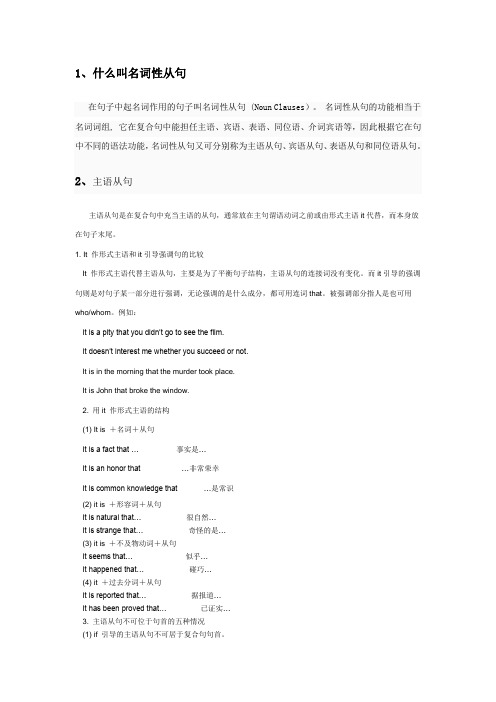
1、什么叫名词性从句在句子中起名词作用的句子叫名词性从句 (Noun Clauses)。
名词性从句的功能相当于名词词组, 它在复合句中能担任主语、宾语、表语、同位语、介词宾语等,因此根据它在句中不同的语法功能,名词性从句又可分别称为主语从句、宾语从句、表语从句和同位语从句。
2、主语从句主语从句是在复合句中充当主语的从句,通常放在主句谓语动词之前或由形式主语it代替,而本身放在句子末尾。
1. It 作形式主语和it引导强调句的比较It 作形式主语代替主语从句,主要是为了平衡句子结构,主语从句的连接词没有变化。
而it引导的强调句则是对句子某一部分进行强调,无论强调的是什么成分,都可用连词that。
被强调部分指人是也可用who/whom。
例如:It is a pity that you didn’t go to see the film.It doesn’t interest me whether you succeed or not.It is in the morning that the murder took place.It is John that broke the window.2. 用it 作形式主语的结构(1) It is +名词+从句It is a fact that … 事实是…It is an honor that …非常荣幸It is common knowledge that …是常识(2) it is +形容词+从句It is natural that… 很自然…It is strange that… 奇怪的是…(3) it is +不及物动词+从句It seems that… 似乎…It happened that… 碰巧…(4) it +过去分词+从句It is reported that… 据报道…It has been proved that… 已证实…3. 主语从句不可位于句首的五种情况(1) if 引导的主语从句不可居于复合句句首。
高中英语教资语法点-从句
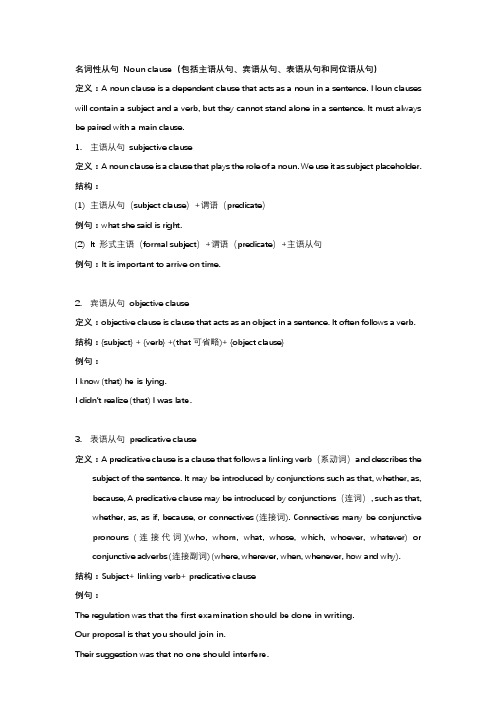
名词性从句 Noun clause(包括主语从句、宾语从句、表语从句和同位语从句)定义:A noun clause is a dependent clause that acts as a noun in a sentence. Noun clauses will contain a subject and a verb, but they cannot stand alone in a sentence. It must always be paired with a main clause.1.主语从句 subjective clause定义:A noun clause is a clause that plays the role of a noun. We use it as subject placeholder.结构:(1)主语从句(subject clause)+谓语(predicate)例句:what she said is right.(2)It 形式主语(formal subject)+谓语(predicate)+主语从句例句:It is important to arrive on time.2.宾语从句 objective clause定义:objective clause is clause that acts as an object in a sentence. It often follows a verb. 结构:{subject} + {verb} +(that可省略)+ {object clause}例句:I know (that) he is lying.I didn’t realize (that) I was late.3.表语从句 predicative clause定义:A predicative clause is a clause that follows a linking verb(系动词)and describes the subject of the sentence. It may be introduced by conjunctions such as that, whether, as, because, A predicative clause may be introduced by conjunctions(连词), such as that, whether, as, as if, because, or connectives (连接词). Connectives many be conjunctive pronouns (连接代词)(who, whom, what, whose, which, whoever, whatever) or conjunctive adverbs (连接副词) (where, wherever, when, whenever, how and why).结构:Subject+ linking verb+ predicative clause例句:The regulation was that the first examination should be done in writing.Our proposal is that you should join in.Their suggestion was that no one should interfere.注:if不能引导表语从句。
名词性从句(Noun Clauses)
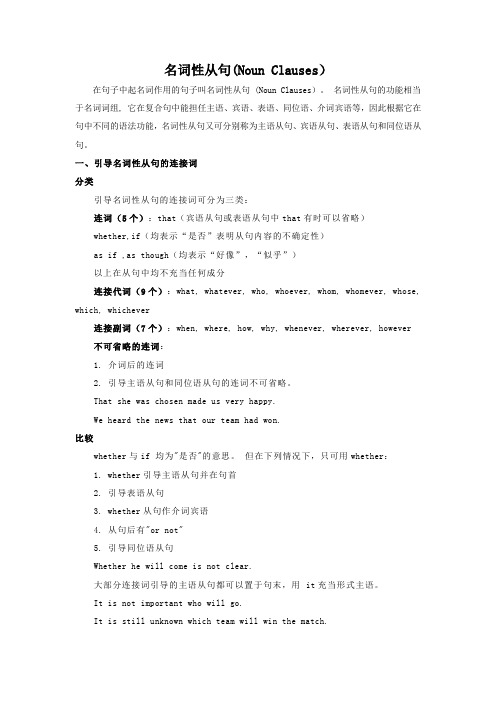
名词性从句(Noun Clauses)在句子中起名词作用的句子叫名词性从句 (Noun Clauses)。
名词性从句的功能相当于名词词组, 它在复合句中能担任主语、宾语、表语、同位语、介词宾语等,因此根据它在句中不同的语法功能,名词性从句又可分别称为主语从句、宾语从句、表语从句和同位语从句。
一、引导名词性从句的连接词分类引导名词性从句的连接词可分为三类:连词(5个):that(宾语从句或表语从句中that有时可以省略)whether,if(均表示“是否”表明从句内容的不确定性)as if ,as though(均表示“好像”,“似乎”)以上在从句中均不充当任何成分连接代词(9个):what, whatever, who, whoever, whom, whomever, whose, which, whichever连接副词(7个):when, where, how, why, whenever, wherever, however 不可省略的连词:1. 介词后的连词2. 引导主语从句和同位语从句的连词不可省略。
That she was chosen made us very happy.We heard the news that our team had won.比较whether与if 均为"是否"的意思。
但在下列情况下,只可用whether:1. whether引导主语从句并在句首2. 引导表语从句3. whether从句作介词宾语4. 从句后有"or not"5. 引导同位语从句Whether he will come is not clear.大部分连接词引导的主语从句都可以置于句末,用 it充当形式主语。
It is not important who will go.It is still unknown which team will win the match.二. 主语从句作句子主语的从句叫主语从句。
名词性从句
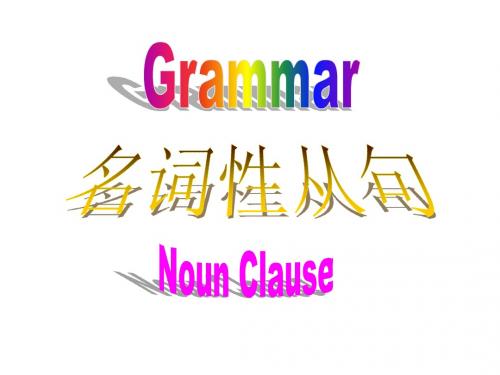
出品
三、宾语从句
在句中充当及物动词或介词宾语的句子叫做 宾语从句。 我不知道你会来这里。 I don’t know (that) you will come here.
三、宾语从句
1、用作及物动词的宾语 (1) They pretended that they were reading in the room. (2) I didn’t know what they were talking about.
以it作形式主语,把主语从句后置的常 用句型有:
1. It+be+形容词+that从句
It is/was certain that – clause
clear
important necessary probable possible
出品
(1)It is certain that she will do
出品
一、主语从句
在句中充当主语的从句叫做主语从句。 他星期三来这里是肯定的。
That he will come here on Wednesday is certain.
注意:从句作主语时,就算是句子意思完整,都 要加上从属连词that, 而且that不能省略,不充当 成分仅起连接作用。 他星期三是否来这里还不肯定。 Whether he will come here on Wednesday is not certain. 注意:主语从句表示“是否” 只用 “whether” 而不用“if”
well in her exam.
(2) It is probable that he told her everything.
www.010englBiblioteka 出品
名词性从句 - Noun Clauses

插入语
How long do you think this fine weather will last? How long do you think will this fine weather last?
宾
宾语从句 Object Clause
有时用it作形式宾语,真正的宾语从句置于句末。 常见的动词有:think, consider, believe, feel, find, make;
appreciate, dislike, hate, like; have, put, take; depend/rely on(相信;指望),see to(确保), answer for(保证)
宾
宾语从句 Object Clause
有时用it作形式宾语,真正的宾语从句置于句末。
He has made it clear that he will not give in. We all thought it a pity that the conference should have
Noun Clauses
Y
UN ANG SENIOR HIGH SCHOOL
主
主语从句 Subject Clause
状 状语从句
补 定语从句
宾 宾语从句 Object Clause
谓
表语从句 Predictive Clause
同
定
表
பைடு நூலகம்
同位语从句 Appositive Clause
名词性从句 Noun Clause
宾
宾语从句 Object Clause
注意:疑问词 + do you think/believe/suppose/expect/imagine + 陈述句
Noun clause 名词性从句

4. The true value of life is not in ______, but _______. A. which we get; what give we B. what we get; what we give C. which do we get; what do we give D. how we get; that we give 5. You can’t imagine ______ when they received these nice Christmas presents. A. how they were excited B. how excited they were C. how excited were they D. they were how excited 6. Do you know ________? A. how many populations there are in the world? B. how much population there is in the world C. how many the population of the world is D. what the population of the world is
注意:用带-ever的引导词 (如whoever, whatever) 引导的主语从句一般不后置。
Whoever leaves the room last should close the door. Whatever we do must be in the interests of the people.
3. ____ leaves the room last ought to turn off the lights. A. Anyone B. The person C. Whoever D. Who 4. _____the sports meet will be held depends on the weather. A. Whenever B. If C. Whether D. That 5. ___ is a fact that English is being accepted as an international language. A. There B. This C. That D. It
noun clauses
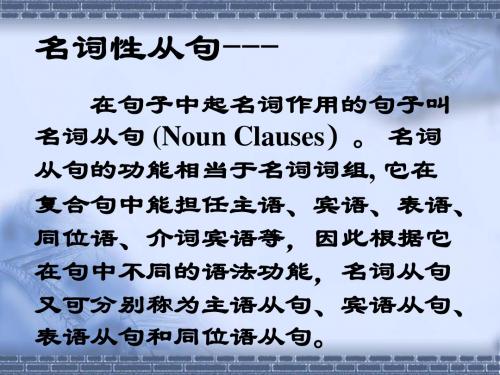
What I want to say is that we must start now. I don’t know whether he will come here. I told her the truth that he had gone abroad.
主语从句--主语从句--在句中做主语的句子, 在句中做主语的句子,处于从属 的位置, 的位置,这样的句子叫主语从句
The idea that he gave surprises many people. . The idea that computers can recognize human voices surprises many people.
The news that Tom would go abroad is told by him. The news that he told me is that Tom would go abroad next year.
同位语从句--同位语从句
常跟在抽象名词后,说明其内容: 常跟在抽象名词后,说明其内容: idea news fact promise answer belief condition doubt fear hope problem proof question reply report suggestion thought truth
名词性从句--名词性从句--在句子中起名词作用的句子叫 名词从句 (Noun Clauses)。 名词 )。 从句的功能相当于名词词组, 从句的功能相当于名词词组 它在 复合句中能担任主语、宾语、表语、 复合句中能担任主语、宾语、表语、 同位语、介词宾语等, 同位语、介词宾语等,因此根据它 在句中不同的语法功能, 在句中不同的语法功能,名词从句 又可分别称为主语从句、宾语从句、 又可分别称为主语从句、宾语从句、 表语从句和同位语从句。 表语从句和同位语从句。
英语中从句类型

英语中从句类型
英语中的从句有以下几种类型:
1. 名词性从句(Noun Clauses):名词性从句在句子中起到名
词的作用,可以作主语、宾语、表语或同位语。
常见的名词性从句
包括宾语从句、主语从句、表语从句和同位语从句。
2. 定语从句(Adjective Clauses):定语从句用来修饰名词
或代词,并且不能独立存在。
通常由关系代词(who, whom, whose, which, that)或关系副词(where, when, why)引导。
3. 状语从句(Adverbial Clauses):状语从句可以表示时间、原因、条件、目的、结果、方式等状语关系。
常见的引导词有连词(while, when, because, if, unless, although, since, etc.)
和疑问词(where, when, why, how, etc.)。
4. 同位语从句(Appositive Clauses):同位语从句用来进一
步解释或说明前面的名词或代词,常由that引导,有时也可以用其
他关系词引导。
5. 感叹句型从句(Exclamatory Clauses):感叹句型从句用
来表示强烈的感情或感叹,通常由what, how, what a引导。
6. 名词化从句(Nominalization Clauses):名词化从句是将
一个完整的句子转化为一个名词,函数如同名词,可以作为主语、
宾语、表语等。
常见的名词化从句有不定式、动名词和现在分词作
为名词的一部分。
这些是英语中常见的从句类型,根据情况的不同,从句的结构和用法会有所变化。
- 1、下载文档前请自行甄别文档内容的完整性,平台不提供额外的编辑、内容补充、找答案等附加服务。
- 2、"仅部分预览"的文档,不可在线预览部分如存在完整性等问题,可反馈申请退款(可完整预览的文档不适用该条件!)。
- 3、如文档侵犯您的权益,请联系客服反馈,我们会尽快为您处理(人工客服工作时间:9:00-18:30)。
名词性从句用法详解2014-3-19引语:1. 任何从句作成份必须有连词连接引导。
(2012)---What made the teacher so angry?---That he was late again.2. 任何从句作成份必须用陈述句序I don’t know what you wanted (2009)I didn’t know what was the matter with the birds (2011)3. 引导词的三大功能引导作用词义作用成份作用4,三类引导词 1. 不完整连词that , whether/if ,2. 连接代词who, whom,what, which,…3. 连接副词when, where, how, why,一、概说名词性从句,即指性质相当于名词的从句,它包括主语从句、宾语从句、表语从句和同位语从句。
5, 名词性从句分分类及引导词主语从句不完整连词连接代词连接副词宾语从句不完整连词连接代词连接副词表语从句不完整连词(加as if/though)连接代词连接副词同位语从句不完整连词连接代词连接副词二、名词性从句的一般引导词1.连接词that 引导名词性从句时,只起连接作用,没有词义,从句意思完整明确不充当句子成分,从句成份齐全在宾语从句中可省略,但引导其他名词性从句时和在第二个宾从中不省略。
如:I hope (that) you enjoy your holiday. 希望你假期过得好。
That he likes you is very obvious. 很显然他喜欢你。
2.连接词whether 引导名词性从句时,只起连接作用,不充当句子成分,有词义,表示“是否”,“不确定”,“待解决。
引导宾语从句时,可换成if,但引导其他名词性从句,后有or not 和作介词的宾语时不能换成if。
如:He asked whether [if] I would show him the way. 他问我是否可以给他带路。
Whether it will do us harm remains to be seen. 是否对我们有害还不明确。
3. 连接代词who(m), whose, which, what 等引导名词性从句时,既起连接作用,又有词义,还要在从句中作主语、宾语、定语等成分。
如:That’s what she wanted to leave for. 这就是她想离开的原因。
Who will come doesn't matter. 什么时候到没有关系。
Tell me which one you like best. 告诉我你最喜欢哪一个。
4. 连接副词when, where, why, how 等引导名词性从句,既起连接作用,又有词义,在从句中作状语。
如:The question is how we should carry out the plan. 问题是怎样执行这个计划。
When she’ll be back depends much on the weather.她什么时候回来很大程度上要看天气。
Why he did it will remain a puzzle forever. 他为什么这样做将永远是一个谜。
三、名词性从句的重要引导词1. what 用于引导名词性从句是一个十分重要的引导词(1)可引导主/宾/表语从句,但不引导同位语从句。
(2)它引导的名词性从句时必须充当两个成份,相当于一个先行词后接一个关系代词。
如: I do n’t know what you want. (anything that)我不知道你想要什么。
I don’t know what you want is this. (all that) 我不知道你所想要的是这个。
(3) what 引导名词性从句时可用作限定词,表示无范围的疑问,其后修饰名词。
如:I gave him what books I had. 我把我所有的书都给他了。
He gave me what money he had about him. 他把身边带有的钱全给了我。
而which则是有范围的选择。
如:I don’t know which dish would you take of the five?注: what+不可数名词=所有的都,what little+不可数名词=虽少但全部。
如:We gave him what (little) help we could. 我们给了他我们力所能及的帮助。
2. whoever, whatever, whichever 等引导的名词性从句时必须充当两个成份,其意分别为“anyone that(所…的一切事或东西)”、“anything that(任何…的人)”、“anyone\anything that(…的任可人或物)”等。
如:Whoever wants the book may have it. 任何人要这书都可拿去。
I’ll do whatever I can to help him. 我们将尽我们所能来挽救他。
Buy whichever is cheapest. 买最便宜的。
另外,它们也可引导让步状语从句,其意为“无论…”、“不管…”,其意相当于no matter who [what, which]。
如:Whatever happens, you must be calm. (whatever = no matter what)He won't eat you, whoever/whomever he is. (whoever = no matter who) 注1:whoever 引导名词性从句时既用作主格也用作宾语;whomever用作宾语。
如:The gift will be given to whoever comes first.The gift will be given to whomever you meet first.注2:who 引导的名性从句表事,whoever 引导的名词性从句表人。
如:Who will come doesn’t matterWhoever comes first will be rewarded.3. why 与 because 的用法区别。
两者均可引导表语从句,但why强调结果,because强调的原因。
如:I had a cold. That’s why I didn't come.(结果)我感冒了,因此我没来。
I didn’t come. That’s because I had a cold.(原因)我没有来,那是因为我感冒了。
但是主语是reason 时,其表语从句引导词只能是that如:The reason why he was late was that he missed the first busWhy引导的定从that引导的表语从句The reason why …. was that…为什么…的原因是…4.as if /though 引导的表语从句以as if (as though)引导的方式状语从句或表语从句,有时用were 型虚拟语气(表示与现在事实相反,谓语动词用一般过去时;若表示与过去事实相反,用过去完成时;表示将来的可能性不大,用would (might, could)+动词原形):The stuffed dog barked as if it is [were, was] a real one. 玩具狗叫起来像真狗He talks as if he had been abroad. 他说起话来好像曾经出过国。
在现代英语中,有时即使从句内容不是事实,也可能用陈述语气:I feel as if [ though] I’m floating on air. 他感到好像漂浮在空中。
It seemed as if the world was at an end。
四.同位语从句同位语从句常放在名词news,idea,fact,promise,question,doubt,thought,hope,message,suggestion,word(消息),possibility等后,对该名词的内容进行解释。
Word came that our team won the final.1. 由that引导I’ve come to the conclusion that it was unwise to do that. 我得出结论这样做是不明智的。
The fact that the money has gone does not mean it was stolen. 那笔钱不见了这一事实并不【注意1】在某些名词(如demand, wish, suggestion等)后面的同位语从句要用虚拟语气。
如:The suggestion that the new rule be adopted came from the chairman. 采纳新规则的建议是主席提出的。
【注意2】引导同位语从句的连词that通常不省略.2. 由whether引导There is some doubt whether he will come. 他是否会来还不一定。
Answer my question whether you are coming. 你回答我的问题:你来不来。
The question whether it is right or wrong depends on the result. 这个是对还是错要看结果。
We are not investigating the question whether he is trustworthy. 。
3. 由连接代词引导Have you any idea who has come? 你知道谁来了吗?4. 由连接副词引导I have no idea when he will come back. 我不知道他什么时候回来。
It is a question how he did it. 那是一个他如何做的问题。
He had no idea why she left. 他不知道她为什么离开。
You have no idea how worried I was! 你不知道我多着急!五、名词性从句的语序名词性从句的词序为陈述句语序,尤其注意:特殊疑问词的名词性从句由连接代词who(m), whose, which, what 或连接副词when, where, why 加陈述句,不要受特殊疑问句的影响而误用疑问句词序。
